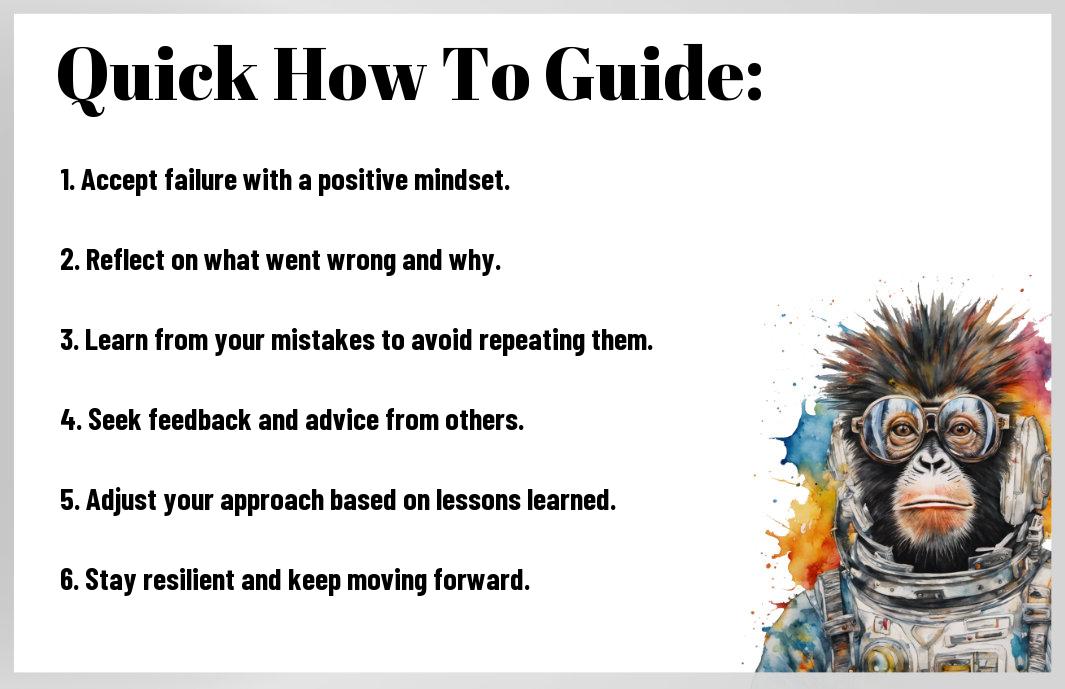Embracing Failure – How To Learn And Grow From Your Mistakes
Mistakes are an inevitable part of life, but it’s how we handle and overcome them that truly defines our success. In this blog post, we will explore the concept of embracing failure as a learning opportunity and a stepping stone towards personal growth. By shifting our perspective on mistakes and adopting a growth mindset, we can transform setbacks into valuable lessons and propel ourselves forward on the path to success. Let’s explore into practical strategies and tips for embracing failure and harnessing its power to learn, adapt, and ultimately thrive.
Key Takeaways:
- Normalization of Failure: It is crucial to understand that failure is a natural part of the learning process and should be embraced rather than feared.
- Learning Opportunity: Each failure presents a valuable opportunity for growth and learning, allowing us to improve ourselves and our strategies.
- Reframing Mindset: Shifting our perspective on failure from negative to positive can lead to increased resilience and motivation.
- Feedback and Reflection: Taking the time to analyze our mistakes, seek feedback, and reflect on our actions can provide valuable insights for future success.
- Stepping out of Comfort Zone: Embracing failure often means pushing ourselves beyond our comfort zone and taking calculated risks to achieve personal and professional growth.
- Building Resilience: Overcoming failure helps build resilience, adaptability, and the ability to bounce back stronger from setbacks.
- Celebrating Progress: Celebrating small wins and acknowledging the progress made, even in the face of failure, can help maintain a positive mindset and motivation for future endeavors.
Understanding Failure
The Psychology Behind Fear of Failure
Any successful individual will tell you that failure is a natural part of the journey towards success. However, the fear of failure often holds people back from taking risks and pursuing their goals. This fear is deeply rooted in our psychology and can stem from a variety of sources, including perfectionism, low self-esteem, and a fear of judgment from others.
Common Factors that Lead to Failure
If we want to learn from our failures, it’s crucial to understand the common factors that can contribute to them. One such factor is a lack of proper planning and preparation. When we fail to plan effectively, we increase the likelihood of encountering obstacles that can derail our efforts. Procrastination and a fear of stepping outside our comfort zone are also common factors that can lead to failure.
- Procrastination
- Lack of proper planning and preparation
- Fear of stepping outside of the comfort zone
After recognizing these common factors, we can take proactive steps to mitigate their impact and increase our chances of success.
Strategies for Learning from Failure
Some failures can be powerful opportunities for growth and development. Embracing failure is an important part of the learning process, and understanding how to learn from mistakes can lead to significant personal and professional growth. To research deeper into this topic, you can check out Embracing Failure: Unlocking Growth Through Learning ….
Reflective Practices That Foster Growth
Any effective strategy for learning from failure involves incorporating reflective practices that foster growth. Reflecting on your mistakes, understanding the reasons behind them, and identifying lessons learned can help you avoid making the same errors in the future. By taking the time to reflect on your failures, you can gain valuable insights that can guide your future actions and decisions.
How-to Incorporate Feedback Effectively
Howto incorporate feedback effectively is a crucial skill for learning from failure. Receiving feedback from others can provide valuable perspectives that you may not have considered. It is important to be open to feedback, actively listen to what others have to say, and use it constructively to improve your performance. By incorporating feedback effectively, you can identify areas for growth and make meaningful changes that can lead to future success.

Building Resilience
Tips for Developing a Growth Mindset
All individuals face failure at some point in their lives. It is how we choose to respond to these setbacks that define our growth. To develop a growth mindset, it is vital to embrace challenges, persist in the face of obstacles, see effort as a path to mastery, learn from criticism, and find lessons in the success of others. The key is to view failure not as a permanent condition but as a stepping stone towards improvement. The growth mindset empowers individuals to take risks, challenge themselves, and ultimately reach their full potential.
Coping Mechanisms for Handling Setbacks
For resilience to flourish, it is crucial to have coping mechanisms in place to handle setbacks effectively. You must acknowledge your emotions, validate your feelings, and understand that it is okay to experience disappointment. By practicing self-compassion, seeking support from others, and reframing negative thoughts into opportunities for growth, you can navigate through adversity with strength and grace.
Growth mindset, on the other hand, encompasses the belief that intelligence and abilities can be developed through dedication and hard work. By adopting a growth mindset, individuals are more likely to bounce back from failures, learn from their mistakes, and persist in the face of challenges. This mindset shift is crucial in building resilience and overcoming obstacles in the pursuit of success.
Practical Applications
Steps to Take Immediately After a Failure
Now is the time to take a step back and assess the situation. Clearly identify what went wrong and why it happened. This introspection will help you avoid making the same mistake in the future. Embrace the failure as a learning opportunity rather than dwelling on the negative aspects.
Long-Term Habits for Continual Learning and Improvement
Immediately after a failure, it is crucial to establish long-term habits that promote continual learning and improvement. Reflect on your failures regularly and keep a journal to track patterns and areas for growth. Seek feedback from others, and be open to constructive criticism. Embrace challenges and step out of your comfort zone to push yourself towards growth.
Applications

To wrap up
Taking this into account, embracing failure is an necessary part of the learning process. By changing our perspective on mistakes and seeing them as opportunities for growth, we can develop resilience, learn valuable lessons, and ultimately achieve success. It is crucial to reflect on our failures, identify the root causes, and make necessary adjustments to avoid repeating the same mistakes. Do not forget, failure is not the end but a stepping stone towards improvement and progress. By learning from our mistakes, we can become better equipped to handle future challenges and achieve our goals with confidence.
FAQ
Q: What is the importance of embracing failure?
A: Embracing failure is crucial because it allows us to learn and grow from our mistakes, leading to personal and professional development.
Q: How can failure be a valuable learning experience?
A: Failure provides an opportunity to reflect on what went wrong, identify areas for improvement, and develop resilience.
Q: What mindset should one adopt when facing failure?
A: Adopt a growth mindset that views failure as a temporary setback rather than a permanent defeat, allowing for continued learning and progress.
Q: How can one turn failure into a positive outcome?
A: By analyzing the reasons for failure, extracting important lessons, and applying them to future endeavors, failure can lead to future success.
Q: What role does resilience play in embracing failure?
A: Resilience allows individuals to bounce back from failure, overcome challenges, and persevere towards their goals despite setbacks.
Q: How does embracing failure contribute to personal growth?
A: Embracing failure fosters self-awareness, humility, and adaptability, ultimately leading to personal growth and development.
Q: What are some practical tips for embracing failure and learning from it?
A: Practice self-reflection, seek feedback from others, set realistic goals, and maintain a positive attitude towards failure to leverage it as a learning opportunity.







